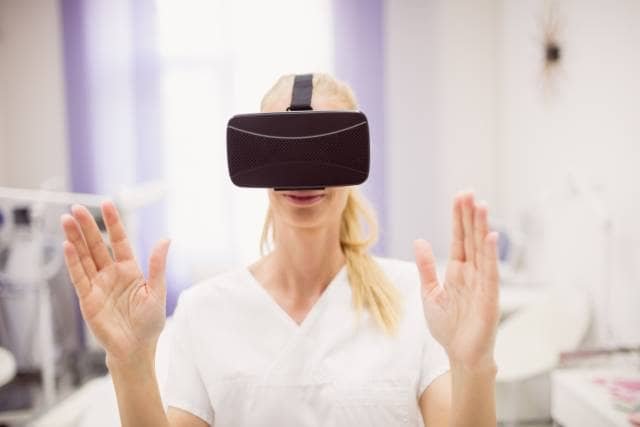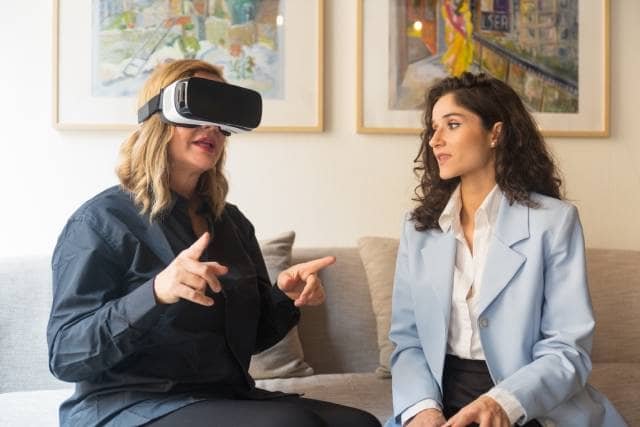
Inicio » Virtual Reality » Application of Virtual Reality in Psychological Therapy
Application of Virtual Reality in Psychological Therapy
Share note:
Introduction to Virtual Reality in the Therapeutic Context
The human mind is a vast universe of thoughts, emotions and experiences. As technology advances, so do our possibilities to explore and understand this inner world. One tool that has been revolutionizing the field of psychology is virtual reality (VR), a window into virtual worlds that has become a valuable ally in modern psychological therapy. We will dive into the application of virtual reality in this context, exploring its evolution, definition and its transformative role in mental health.
Defining Virtual Reality in Therapy
To understand how virtual reality intertwines with psychological therapy, it is crucial to break down its essence. In simple terms, VR is a computer-generated simulation that immerses us in three-dimensional environments. In this digital space, the user can not only see but also interact with the content. The sensation of being physically present and the ability to manipulate virtual elements open up a world of possibilities in the therapeutic field.

Modes of Interaction in the Virtual Experience
The virtual reality experience adapts to different forms of interaction. From simple visual observation to active manipulation of virtual objects, this technology allows patients to explore and experiment in a safe and controlled environment. The ability to move and manipulate elements adds a layer of realism to the experience, expanding the opportunities for therapy.
Types of Virtual Reality Simulations Used in Therapy
Within the umbrella of virtual reality, different therapeutic approaches are deployed. Interactive virtual reality, which involves the manipulation of virtual objects, and mixed reality, which combines virtual and real elements, are two of the most prominent types. These types of simulations have become a powerful tool for addressing a wide range of psychological challenges.
Virtual Exposure Therapy and its Effectiveness in the Treatment of Phobias
Exposure therapy is a cornerstone in the treatment of phobias and related disorders. Virtual reality offers a unique and effective approach to address these concerns. Patients can face their fears in a controlled virtual environment, which can speed up the therapeutic process and minimize anxiety. Compared to traditional therapies, virtual exposure proves to be faster and less invasive.

Benefits of Virtual Reality in Psychological Treatment
The advantages of virtual reality in psychological therapy are remarkable. In addition to speeding up the therapeutic process, this technology provides safety and flexibility. Patients can experience challenging situations without putting themselves at risk and can withdraw at any time, providing greater control over their treatment. Virtual reality has also proven to be an effective complement to traditional therapies.
Success Stories: Application of Virtual Reality in Therapy
The effectiveness of virtual reality in psychological therapy shines through in real cases. Patients who faced paralyzing phobias found in VR an ally to overcome their fears. Case studies support its significant improvements, supporting the usefulness and transformative potential of this technology in mental health.
Considerations and Limitations of Virtual Reality Use
Despite its benefits, virtual reality is not without its challenges. Some patients may experience dizziness or nausea during virtual exposure, and the technology does not suit everyone equally. However, approaching these limitations with caution and adjusting the approach according to individual needs can maximize therapeutic benefits.

The Role of the Practitioner in Virtual Reality Therapy
Virtual reality in psychological therapy is a reflection of the collaboration between the human mind and technology. The therapist remains a crucial figure in the process, guiding and tailoring the virtual experience to address the patient’s specific needs. Virtual reality, far from replacing the professional, enhances their ability to provide a holistic and effective approach.
Conclusions: Opening New Perspectives in Psychological Therapy.
Virtual reality has crossed the frontiers of science fiction to become a tangible tool in psychological therapy. His ability to immerse patients in controlled situations and facilitate the confrontation of fears offers a fresh and effective approach to treatment. As this technology evolves, so do our perspectives on therapy, urging us to embrace it with responsibility and vision. Reality may have limits, but imagination and innovation are infinite.
Jean-Jacques Rousseau put it succinctly, “The world of reality has its limits, but the world of imagination is unlimited.”
Would you like to apply Virtual Reality in your projects? At Virtual Arena we are specialists in VR consulting and development for companies and institutions.
Recent articles

3D Animation: Current Trends and Innovations

Services marketing: Effective strategies for customer loyalty

3D Hologram What is it and what are its applications?
Do you have a project in mind?
Related articles




